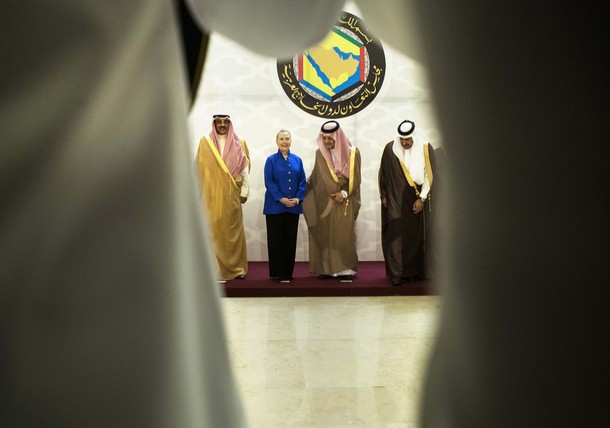Since the beginning of the protests against the Assad regime in March 2011, the international community’s response to the Syrian crisis has been characterized by disunity. This collective vacuum has boosted the role of regional actors, particularly Saudi Arabia and Qatar, who have been extremely active with the support of virtually all GCC countries.
After a failed attempt at diffusing the crisis by dealing with Assad directly, both countries have been strongly supporting the Syrian opposition, while calling for Assad to step down. In truth, this position should not come as a surprise, as Saudi Arabia and Qatar both have numerous reasons to wish Assad gone.
Firstly, both countries believe that Iran – their biggest regional competitor – would be dealt a tough blow if the Alawite regime were to fall. By losing its main ally in the Arab Middle East, Iran would be restored to its “natural size,” shifting the regional balance of power.
Secondly, both countries also benefit internally from supporting the anti-Assad forces, as this allows them to deflate internal criticism of the regimes as inherently reactionary and unwilling to embrace the “Arab Spring.” In addition, both countries fear that the continuation of internal violence and instability in Syria may have adverse regional consequences. For example, the continuous influx of Syrian refugees could bring trouble to one of the Kingdom’s main regional allies, Jordan.
Finally, both Qatar and Saudi Arabia have been willing and able to play a leading regional role against Assad both because of their significant financial resources, as well as due to the ongoing demise of traditional leaders of the Arab world, like Egypt.
In this context, Qatar and Saudi Arabia have led the anti-Assad efforts, obtaining both the expulsion of Syria from the Arab League as well as the withdrawal of the diplomatic staff of the GCC countries from Damascus. Similarly, during the first “Friends of Syria” meeting in February 2012, the countries took interventionist positions with respect to the Assad regime. On that occasion, Qatar reiterated its desire to see the creation of a peacekeeping force led by the Arab league, while Saudi Arabia went as far as openly advocating in favor of arming the opposition. What’s more, once it became clear that the international community was unwilling to adopt any forceful measure with respect to Syria, the Saudis pulled their delegation from the meeting, to protest the international community’s “inaction.” This activism has further increased in the past month, with Qatar approving a fund of USD 100 million to acquire weapons for the Syrian opposition, and with Saudi Arabia openly discussing its desire to arm the anti-Assad forces.
More recently, at the second “Friend of Syria meeting,” held in Istanbul on April 2, both countries announced their project to create a special fund to pay both the Free Syrian Army as well as soldiers who defect Assad.
Saudi and Qatari involvement in the Syrian crisis in the past months has been public, intense, and unequivocal; certainly a stark departure from Saudi’s classic “behind-the-scene-style” diplomacy and from Qatar’s role as regional mediator. This policy shift is especially remarkable in the case of Qatar, as the country had until not so long ago been on friendly terms with the Iranian and Syrian regimes.
This departure from both countries’ traditional roles within the Middle East underlines the importance both states assign to the departure of Assad. This is particularly the case as standing up against the Syrian regime has not exactly been cost-free. For instance, it has placed a strain in their relations with both Russia and Iran, while risking tensions within the Arab League in general and Iraq specifically. Both countries have de facto betted on Assad’s fall and if the Alawite regime were to survive the storm, both Saudi Arabia and Qatar would likely be faced with a new regional enemy.
Given the extent of the commitment of both Saudi Arabia and Qatar to regime change, it is not surprising that these countries have been at the forefront of pressing the international community to directly intervene in the crisis, to fund and arm the opposition, and to recognize the Syrian National Council as the legitimate government.
The most recent chance for the two countries to push their agenda came on the second “Friends of Syria meeting.” On that occasion, Saudi and Qatari’s call for greater involvement in Syria was matched by the growing concern of other regional powers, like Turkey.
However, the route chosen by these Gulf countries to support the anti-Assad opposition is extremely problematic: unchecked distribution of weapons and funds can only lead to an escalation of internal violence, while representing a concrete proliferation and stability threat at the internal and regional level. In this sense, the recent coup in Mali – fueled by the uncontrolled flux of weapons from Libya – should serve as a lesson and an invitation to refrain from providing weapons to an internally divided and still not fully known opposition.
Therefore, the international community should continue to refrain from arming the opposition, while stepping up its political support and by pushing it to overcome its differences and create a truly united front. It should also actively urge Assad to step down and respond to Turkey’s proposals to create humanitarian corridors to ease the civilian suffering. If it fails to do so, countries like Saudi Arabia and Qatar will feel both the need and the responsibility to go solo on Syria and continue to arm the opposition.
Benedetta Berti is a Research Associate at the Institute for National Security Studies (INSS) at Tel Aviv University (TAU), a lecturer at TAU and a member of the Atlantic Council’s Young Atlanticist Working Group.
Yoel Guzansky is a research fellow at the Institute for National Security Studies at Tel Aviv University and a former member of Israel’s National Security Council.
Image: gccmeeting.jpg
